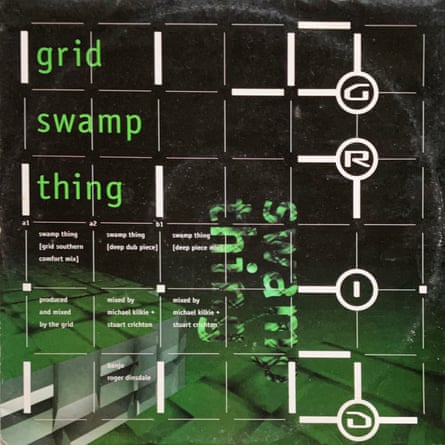Richard Norris, songwriter, programmer
I met Dave Ball after I went to interview Genesis P-Orridge of Throbbing Gristle for Strange Things Are Happening magazine, and we ended up making Jack the Tab, the UK’s first acid house album, under the guise of “various artists”. On the second day in the studio Gen brought in Dave. I was a bit wary because he’d been a proper pop star with Soft Cell, but NME put Jack the Tab on the cover and Warners offered us a deal even though – or perhaps because – the record contained the sounds of the bedroom antics of Gen and Paula P-Orridge and of howling wolves.
After Jack the Tab, the Grid was intended to be a separate new project with me and Gen, but after Gen dropped out I thought of Dave. We bonded over John Waters films and made music with electronics and samplers. None of our records went Top 20 until Swamp Thing, which came about after Dave found a banjo player, Roger Dinsdale, in a pub. We recorded him playing the banjo, sampled him and looped it.
The “Feel, feel all right …” vocal sample comes from Lloyd and Patsy’s Papa Do It Sweet, a filthy reggae record from 1973. Swamp Thing was meant to be joyous and immediate for the dancefloor, but we also knew that a banjo house record would piss off the people who were writing long, boring articles about so-called “intelligent techno”.
Swamp Thing got the dancefloor seal of approval when Mike Pickering from M People played it at the Haçienda. Then, when we came off stage at the Radio 1 roadshow in Cleethorpes, they told us it was on their playlist. The single ended up going to No 3 and was in the charts for 17 weeks over the summer and autumn of 94.
When we did Top of the Pops, Roger sat in a chair with a colander on his head like he was being fried in an electric chair. Later, [producer] Max Perry choreographed a line-dancing version of the song called Swamp Thang, which became big in America. There are videos all over YouTube of people line dancing to it in car parks and supermarkets. With Beyoncé making a country album it all feels quite timely.
Dave Ball, songwriter, synthesisers, samplers
I’d been a reluctant international pop star with Soft Cell. Neither Marc Almond nor I had expected to be that famous. After we disbanded in 1984, I got married and my wife and I had a child. At first it was nice to be out of the craziness, but I started getting itchy feet. I’d known Gen since we first met at Soft Cell’s label, Some Bizzare. When we hooked up on Jack the Tab, Gen had ditched the Throbbing Gristle-era combat gear for a mad psychedelic guru look. My mum asked: “Why are you wearing gold Dr Martens?” It was the only time I ever saw Gen speechless.

After Gen left, Richard and I became the Grid. I’d just got a new sequencer, a sampler and drum machine. It was the perfect project for them. Richard was good at finding drumbeats, sound effects and voiceovers; I’d sample them and put them into tracks. When we were making the third album, Evolver, I heard this music coming out of an Irish pub in Marylebone and walked in: it was Irish folk, but stomping. Afterwards I spoke to the banjo player, who had long hair, tinted glasses and smelled of cannabis. I asked: “Would you like to come to the studio?” When I told him he’d get paid, his eyes lit up behind his dark glasses.
We got him to lay down some generic riffs over a bassline and drumbeat. We weren’t using digital then apart from computers, so we had this massive tape loop spliced together, running all over the studio. People thought Swamp Thing was a novelty record but we just crossed the boundary from being underground to pop. It was a smash in loads of countries.
When we played it at Ministry of Sound with Roger, there was a girl at the front staring at his banjo like she’d never seen one before. The song was used in the John Waters film Pecker and in Robert Altman’s Prêt-à-Porter. When we played at the Hordern Pavilion in Sydney, Mick Jagger came to watch us to check out the competition, but I guess Keith Richards can’t have been convinced about the banjo.
Source: theguardian.com





















